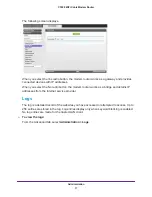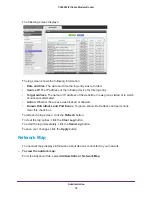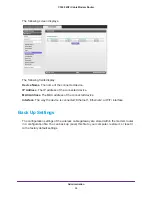
Advanced Settings
51
C3000 WiFi Cable Modem Router
5.
If the wireless computer or device you want displays in the list, click its radio button to
capture its MAC address. Otherwise, type its MAC address. The MAC address is found on
the computer or device.
6.
If no device name displays, type a descriptive name for the computer or device that you are
adding.
7.
Click the
Add
button.
The Wireless Card Access List screen displays.
8.
Click the
Apply
button.
Port Forwarding and Port Triggering
By default, the modem router blocks inbound traffic from the Internet to your computers
except for replies to your outbound traffic. Create exceptions to this rule for these purposes:
•
To allow remote computers on the Internet to access a server on your local network.
•
To allow certain applications and games to work correctly when your modem router does
not recognize their replies.
Your modem router provides two features for creating these exceptions: port forwarding and
port triggering. The next sections provide background information to help you understand
how port forwarding and port triggering work, and the differences between the two.
Remote Computer Access Basics
When a computer on your network accesses a computer on the Internet, your computer
sends your modem router a message containing the source and destination address and
process information. Before forwarding your message to the remote computer, your modem
router must modify the source information and create and track the communication session
so that replies can be routed back to your computer.
Here is an example of normal outbound traffic and the resulting inbound responses:
1.
You open a browser, and your operating system assigns port number 5678 to this
browser session.
2.
You type http://www.example.com into the URL field, and your computer creates a web
page request message with the following address and port information. The request
message is sent to your modem router.
Source address
. The IP address of your computer.
Source port number
. 5678, which is the browser session.
Destination address
. The IP address of www.example.com, which your computer finds
by asking a DNS server.
Destination port number
. 80, which is the standard port number for a web server
process.
















































